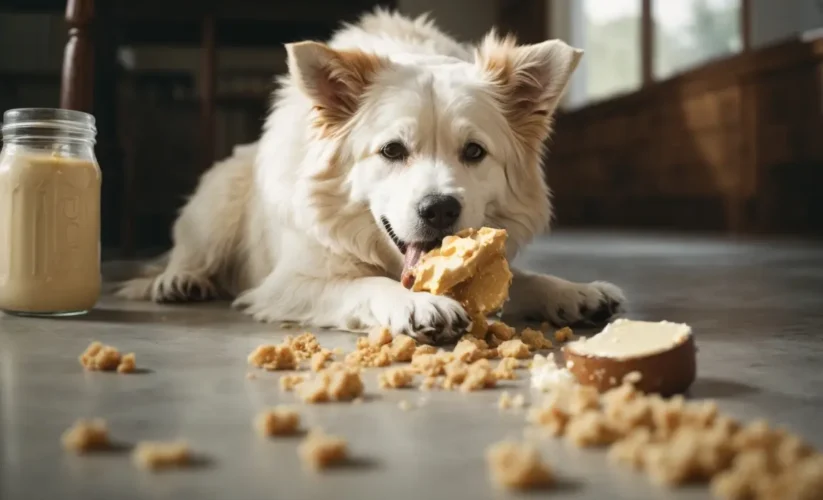Can dogs eat nutter butter?

As a dedicated dog owner and enthusiast, I’ve often found myself pondering over the various human foods that our furry friends can or cannot indulge in. Today, I want to address a question that might have popped into the minds of many dog parents: Can dogs eat Nutter Butter? Nutter Butter, the popular peanut butter sandwich cookie, has been a staple in many households, often finding its way into our snack routines. But when those pleading puppy eyes gaze at us while we’re enjoying a Nutter Butter, it’s crucial to know whether sharing this treat with our canine companions is a safe choice.
Understanding the dietary needs and restrictions of dogs is essential for their health and well-being. Dogs, much like humans, enjoy a bit of variety in their diet. However, their bodies react differently to certain human foods. It’s not just about whether a food item is toxic; it’s also about understanding how certain ingredients can impact their overall health. With this in mind, let’s delve into the world of Nutter Butter and its implications for our four-legged friends. We’ll explore the ingredients, nutritional content, and potential risks, providing a comprehensive guide for dog owners. Our journey will take us through the pros and cons of Nutter Butter for dogs, a look at other types of butters, and conclude with final thoughts on the topic.
Is Nutter Butter Good for Dogs?
Nutter Butter cookies, with their tempting peanut butter filling, often lead dog owners to ask, ‘Can dogs eat Nutter Butter?’ While peanut butter in its purest form can be a healthy treat for dogs, providing healthy fats and proteins, the case with Nutter Butter cookies is not as straightforward
The primary ingredient of concern in Nutter Butter is the sugar content. While dogs can digest sugar, it’s not an essential part of their diet and should be given in moderation. High sugar intake can lead to obesity, dental problems, and even diabetes in dogs. Additionally, Nutter Butter contains added oils and fats, which can contribute to an unhealthy weight gain.
Moreover, Nutter Butter cookies contain wheat flour, which is a concern for dogs with grain allergies or sensitivities. While many dogs can tolerate wheat, those with specific allergies may experience adverse reactions like itching, gastrointestinal upset, or ear infections.
Another point to consider is the nutritional balance. Nutter Butter cookies lack the essential nutrients that dogs need for a healthy diet. They are high in calories with minimal nutritional benefits, which can disrupt a dog’s balanced diet.
Lastly, the small size and crunchy texture of Nutter Butter could pose a choking hazard, especially for smaller breeds or dogs that tend to gulp their food without chewing properly.
Is Nutter Butter Bad for Dogs?
While Nutter Butter isn’t necessarily toxic to dogs, it’s not an ideal treat due to several reasons. Firstly, the high sugar content, as mentioned earlier, poses significant health risks. Consistent consumption of sugary treats can lead to chronic health issues like obesity, which is a growing concern among pets. Obesity in dogs can lead to a host of other problems like joint pain, heart disease, and reduced life expectancy.
The presence of artificial flavors and preservatives in Nutter Butter is another red flag. These additives, while safe for human consumption, can be hard on a dog’s digestive system. Dogs have a more sensitive gastrointestinal tract compared to humans, and artificial ingredients can cause digestive upset, including diarrhea and vomiting.
It’s also important to note the potential for xylitol content in certain peanut butter-based products. Xylitol is an artificial sweetener that is extremely toxic to dogs, even in small amounts. While Nutter Butter does not contain xylitol, the risk associated with peanut butter treats, in general, should make dog owners cautious.
Another concern is the risk of pancreatitis, a condition that can be exacerbated by high-fat foods. Nutter Butter contains added oils and fats that, if consumed regularly, could increase the risk of developing pancreatitis in dogs. This condition is painful and can be life-threatening if not treated promptly.
Lastly, feeding Nutter Butter regularly can lead to poor dietary habits. Dogs who frequently consume human snacks might become picky eaters, refusing their regular, nutritionally balanced dog food. This can lead to nutrient deficiencies and health problems over time.
Are Other Butters Safe For Dogs?
When considering other types of butters for dogs, the focus should be on natural, single-ingredient products. Peanut butter, as mentioned, can be a safe option if it’s pure, unsweetened, and does not contain xylitol. It’s a good source of protein and healthy fats, which can be beneficial for a dog’s coat and skin health. However, it should be given in moderation due to its high calorie and fat content.
Almond butter is another alternative, but it should be used cautiously. While almonds are not toxic to dogs, they are not easily digested and can cause gastrointestinal upset. Moreover, almond butter is often high in fat and calories, similar to peanut butter.
Coconut butter, made from the meat of coconuts, is a healthier option. It contains medium-chain triglycerides, which can aid in metabolism and improve skin and coat health. However, like other butters, it should be given in moderation due to its high-fat content.
It’s crucial to avoid butters with added salt, sugar, or artificial sweeteners. Always read the ingredient list carefully before offering any type of butter to your dog. It’s also advisable to consult with a veterinarian before introducing new foods into your dog’s diet, especially if they have existing health conditions.
Final thoughts
In conclusion, while Nutter Butter is not toxic to dogs, it’s not recommended due to its high sugar content, presence of artificial additives, and lack of nutritional value. The occasional Nutter Butter crumb won’t harm your dog, but these treats should not be a regular part of their diet.
When it comes to other types of butters, natural and unsweetened options like pure peanut butter can be a healthy treat in moderation. However, always be vigilant about the ingredients and avoid anything with xylitol or excessive fats and sugars.
As dog owners, our primary goal is to ensure the health and happiness of our pets. This includes being mindful of their diet and treating them responsibly. Treats should only make up a small percentage of a dog’s diet, and the focus should always be on high-quality, nutritionally balanced dog food.
Remember, every dog is different, and what works for one might not be suitable for another. Always observe your dog’s reaction to new foods and consult with a veterinarian if you have any concerns. By being informed and cautious, we can ensure that our furry friends live long, healthy, and happy lives.










